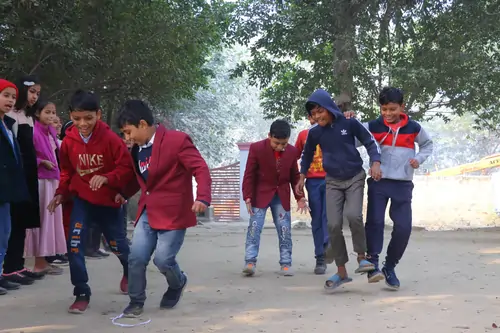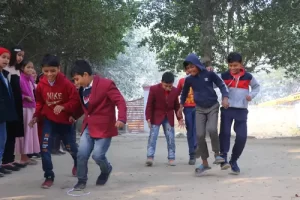How to Address Malnutrition and Child Health in Urban Slums

How to Address Malnutrition and Child Health in Urban Slums

Malnutrition in India’s urban slums poses serious health challenges, leading to high rates of undernutrition and child mortality. A CRY survey found that 36% of 3,650 children in Delhi’s slums are underweight, with one-third severely wasted. Malnutrition was higher among girls than boys at 38% against 34%, the survey found. Malnutrition not only affects the physical well-being of children, but also their cognitive development, immunity, and long-term health outcomes.
To address this problem, a multi-sectoral and holistic approach is needed, involving the government, non-governmental organizations (NGOs), the private sector, and the community. In this article, we will discuss some of the key strategies and interventions that can help improve malnutrition and child health in urban slums, with a focus on New Delhi and the role of My Abhinandan NGO, a non-profit organization that aims to improve the lives of slum dwellers through various interventions, such as health camps, nutrition education, vocational training, and women empowerment.
Improving Maternal Health and Nutrition
One of the key factors that influences the nutritional status of children is the health and nutrition of their mothers before, during, and after pregnancy. Maternal factors, such as education, age, and anemia, have a significant impact on the birth weight, growth, and development of children. Therefore, it is essential to improve maternal health and nutrition by providing antenatal and postnatal care, iron and folic acid supplementation, immunization, and family planning services. Moreover, it is important to promote exclusive breastfeeding for the first six months and appropriate complementary feeding practices thereafter, as breast milk provides the optimal nutrition and protection for infants. NGOs such as the Breastfeeding Promotion Network of India (BPNI) and MAMTA work to raise awareness and support mothers on optimal infant and young child feeding practices.
Enhancing the Integrated Child Development Services
The Integrated Child Development Services (ICDS) is a government scheme that provides supplementary nutrition, health check-ups, immunization, and preschool education to children under six years and pregnant and lactating women. The ICDS is the largest community-based program in the world, reaching more than 100 million beneficiaries in India. However, the ICDS faces several challenges, such as inadequate infrastructure, staff shortage, irregular supply of food, and low utilization of services. Child Welfare NGOs can play a vital role in strengthening the ICDS by monitoring its implementation, providing technical assistance, mobilizing community participation, and advocating for policy reforms.
Addressing the Social Determinants of Malnutrition
Malnutrition is not only a result of insufficient food intake, but also a consequence of various social, economic, and environmental factors that affect the availability, accessibility, and affordability of nutritious food, as well as the utilization of health services and the adoption of healthy behaviors. Some of these factors include poverty, inequality, gender discrimination, and lack of education and awareness. NGOs can help address these issues by empowering women and girls, providing livelihood opportunities, improving sanitation and hygiene, and educating communities on the importance of nutrition and health.
Promoting Community-Based Nutrition Management
One of the ways to ensure a sustainable and diversified food supply for vulnerable populations is to promote community-based nutrition management, such as kitchen gardens, grain banks, and poultry farms. These initiatives can help improve food security, dietary diversity, and income generation, as well as reduce dependence on external sources of food. NGOs can support these initiatives by providing seeds, tools, training, and market linkages.
The Role of My Abhinandan NGO in New Delhi
One of the best Healthcare NGOs that is working to address malnutrition and child health in urban slums in New Delhi is My Abhinandan, a non-profit organization that aims to improve the lives of slum dwellers through various interventions, such as health camps, nutrition education, vocational training, and women empowerment. My Abhinandan works in collaboration with local government agencies, health centers, schools, and community groups to reach out to the most marginalized and vulnerable sections of society. Some of the activities and achievements of My Abhinandan are:
-
Regular health camps in slums provide free medical check-ups, treatment, counseling, and health awareness for children and women.
-
Nutrition education sessions for mothers and children cover breastfeeding, balanced diets, and food hygiene, with demonstrations and recipes using affordable local ingredients.
-
Offering vocational training in tailoring, beauty care, and computer skills for women and youth to boost employability, with connections to microfinance and job opportunities.
-
Empowering women and girls through groups to address issues like domestic violence, child marriage, and gender discrimination while advocating for rights and awareness campaigns.
Final Thoughts
By working at the grassroots level, My Abhinandan is making a positive difference in the lives of slum dwellers in New Delhi, especially children and women, who are the most vulnerable to malnutrition and poor health. My Abhinandan believes that every child has the right to a healthy and happy life, and strives to create a conducive environment for their growth and development.
Recent Posts
- Abhinandan 2.0 at Global CSR & ESG Awards 2025: Advocating Collective Impact with Accountability
- AbhiSAARTHI Fellows: A Journey Through Governance & Community Engagement
- A New Chapter of Hope Unfolds: Inauguration of the JaksonAbhiKIDS Care Centre in Greater Noida
- Press Release Embargoed Till 28 October 2024
- New Covid-19 Variant JN-1: What You Need to Know